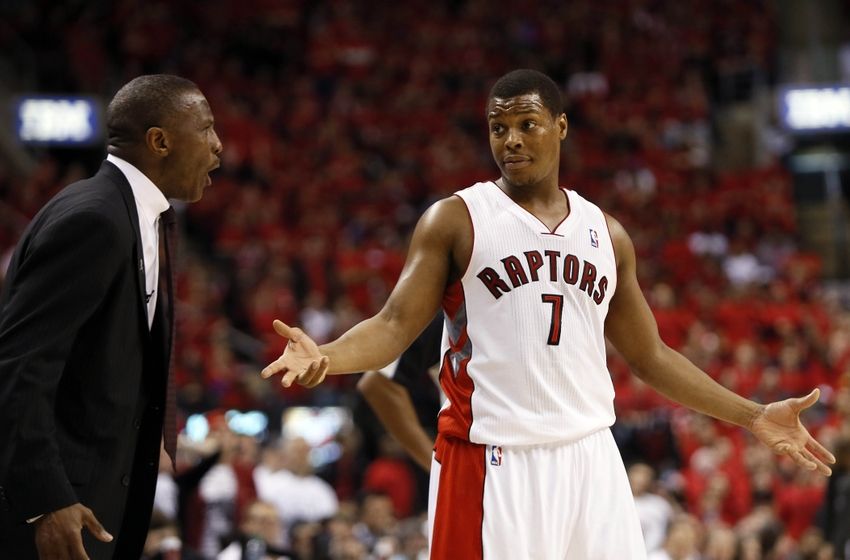The first offseason domino that was expected to fall will actually remain standing, as Dwane Casey will reportedly return to start a fifth season as head coach of the Toronto Raptors.
After the Raptors limped to the finish line with a regular season record of just 25-25 in 2015 and closed the year with an embarrassing first round sweep at the hands of the Washington Wizards, many expected Casey to be relieved of his duties this offseason. By all accounts though, Casey will be returning to Toronto and will simply have some new assistants to help him along.
Whether you agree with the decision or not is beside the point. The decision has already been made. By all accounts there will be no press conference or formal announcement made (you don’t generally announce that a coach who is already under contract will be returning). Masai Ujiri and Casey will simply go about their business moving forward and prepare for the upcoming season together.
The question now moves from “What do we do with Casey?” to “What does Casey’s return mean in regards to the roster construction?”
Toronto played an ugly, isolation heavy offense and somehow managed to parlay it into the third most efficient regular season offense in the league at 108.1 points per 100 possessions. Only the Los Angeles Clippers and Golden State Warriors scored at a better rate than Toronto. Even though it wasn’t pretty to look at, and got exposed in the playoffs by a solid defensive team in Washington, the Raptors were a great scoring team in the regular season.
The bad news is that the Raptors needed their offense to be elite as it was their defense that failed them horribly. The Raptors had the 23rd worst defense in the NBA, allowing 104.9 points per 100 possessions. The Brooklyn Nets were the only team with a worse regular season defensive record that still managed to make the playoffs.
This mark is unacceptable for a coach who prides himself on his defensive principles. Casey got stubbornly focused on his strategy to rotate and switch on defense, despite it clearly not working with the roster at hand. This is not to say that the strategy can’t be an effective one, but merely to say that Casey didn’t have the horses to run his desired defense.
With that being the case, one of two things will likely happen moving forward:
- Casey, or one of his new assistants, envisions a way to adapt his defensive philosophies to better fit the roster that he is provided.
- Ujiri shapes the roster at least in part around Casey’s stylistic vision.
My personal belief is that Casey’s return is another indication that significant roster changes may be on deck.
No one would shape an entire roster around a lame duck coach with just one guaranteed year remaining on their contract, let alone a coach without a significant track record of success, but Ujiri will still likely try to provide Casey with some players who better fit his system (see: long and athletic).
As strange as it sounds, bringing back Casey actually gives more credence to the idea of trading Kyle Lowry. The two have notoriously butted heads at points throughout their tenure together, which culminated in some less than glowing comments from Lowry in his season ending interview.
“I respect Casey as a man,” Lowry deadpanned. “He’s a hell of a guy. At the end of the day, like I said, it’s not my choice, not my decision. At the end of the day, yeah, if he’s the coach, I’m a player. I’ve said that a couple of years now. At the end of the day, whoever the coach is, if he’s the coach, then I’ll be back playing for coach Casey.”
Lowry didn’t let up when he added: “There’s a lot of things you can say (publicly), but there’s a lot of things internally that probably need to be fixed. ”There is noticeable tension in Lowry’s words and it’s hard to get around it. The two have issues that they will need to be resolved. If they can’t be resolved, or if there are concerns about Lowry moving forward, then a trade might be the best route for everyone.
Why is this important? Lowry will be turning 30 during next season, plays a style of basketball that could at times be described as reckless, is coming off of his first All Star appearance, and may never have greater value than he currently does. In March Bill Simmons ranked Lowry 16th in his annual NBA Trade Value column. This ranking is easily too high (he was two spots ahead of Kawhi Leonard…pure insanity) but does give a good idea of the type of value that Lowry has around the league.
Would Sacramento trade Darren Collison, Sauce Castillo, and their 5th overall pick (Willie Trill Cauley-Stein or Justise Winslow) for Lowry (the Bill Simmons special)? Or would Utah, who desperately wants their young core to make the playoffs next season, be willing to move someone like Dante Exum for that chance?
We don’t know for sure, and can’t foresee what trades will be available, but calls will assuredly be made if the burned bridges can’t be rebuilt by Casey and Lowry.
How did we get here? I just never would have guessed we’d get to a point where Dwane Casey could have greater security moving forward with the Raptors than Kyle Lowry.



